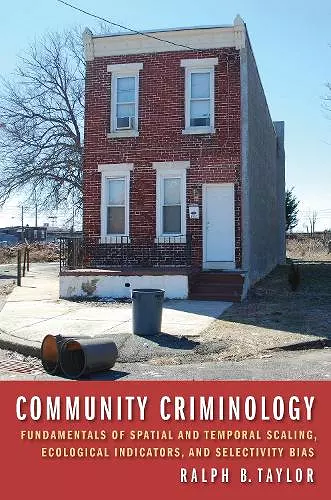Community Criminology
Fundamentals of Spatial and Temporal Scaling, Ecological Indicators, and Selectivity Bias
Format:Hardback
Publisher:New York University Press
Published:9th Jan '15
Currently unavailable, and unfortunately no date known when it will be back

For close to a century, the field of community criminology has examined the causes and consequences of community crime and delinquency rates. Nevertheless, there is still a lot we do not know about the dynamics behind these connections. In this book, Ralph Taylor argues that obstacles to deepening our understanding of community/crime links arise in part because most scholars have overlooked four fundamental concerns: how conceptual frames depend on the geographic units and/or temporal units used; how to establish the meaning of theoretically central ecological empirical indicators; and how to think about the causes and consequences of non-random selection dynamics.
The volume organizes these four conceptual challenges using a common meta-analytic framework. The framework pinpoints critical features of and gaps in current theories about communities and crime, connects these concerns to current debates in both criminology and the philosophy of social science, and sketches the types of theory testing needed in the future if we are to grow our understanding of the causes and consequences of community crime rates. Taylor explains that a common meta-theoretical frame provides a grammar for thinking critically about current theories and simultaneously allows presenting these four topics and their connections in a unified manner. The volume provides an orientation to current and past scholarship in this area by describing three distinct but related community crime sequences involving delinquents, adult offenders, and victims. These sequences highlight community justice dynamics thereby raising questions about frequently used crime indicators in this area of research. A groundbreaking work melding past scholarly practices in criminology with the field’s current needs, Community Criminology is an essential work for criminologists.
In an area too often marked by static thinking, Ralph Taylor outlines a fresh paradigm for 'community criminology.' With inordinate conceptual and methodological erudition, he unpacks the communities and crime relationship in an unprecedented way. This volume promises to be of enduring valuea work that few criminologists can afford to ignore. -- Francis T. Cullen,Distinguished Research Professor, University of Cincinnati
Long known for his careful and sophisticated empirical work on crime in community context, with this book Ralph Taylor seeks nothing less than the reinvention of community criminology. It should be read by anyone who cares about the fundamental conceptual and methodological problems of the field--from macro-micro integration to selection effects. This is analytical criminology at its very best. -- Richard B. Rosenfeld,co-editor of Economics and Youth Violence: Crime, Disadvantage, and Community
Ralph Taylor has crafted a brilliant book tackling core issues in community criminology, as well as the social sciences more generally. He navigates complex meta-theoretical, theoretical, conceptual, and empirical issues with impressive skill, erudition, and clarity. The book provides an incisive critique of what we know and do not know about communities and crime, and it lays out a highly promising agenda for future research. -- Steven F. Messner,co-author of Crime and the American Dream
This is an important book and perhaps one of the richest in insight I have read on communities and crime. There is just an amazing amount of material here on communities, criminal motivation, crime and place, hot spots of crime, history of criminology, and more. * American Journal of Sociology *
The authors admonitions about fallacies in reasoning that too often trip up multi-level, multi-variable analyses are refreshing and beneficial. The decisive message calls for multidisciplinary collaborations built upon extended time horizons. * Choice *
ISBN: 9780814725498
Dimensions: unknown
Weight: 590g
336 pages